You’re standing in your kitchen, a colorful array of fruits spread out before you – apples, bananas, grapes, maybe a mango or two. It’s like a fruit market right here in your home. Now comes the million-dollar question: Which of these juicy gems should take a trip to the fridge, and which should claim a spot on the countertop?
Refrigerating some fruits can keep them fresh and delicious, but for others, it’s a no-go. This common confusion about fruit storage is something we’ve all grappled with at one point or another. After all, no one wants to bite into a mealy apple or a rock-hard peach.
In today’s blog post, we’re going on a fruit-filled adventure to demystify this whole refrigeration riddle. We’ll explore and clarify which fruits should be refrigerated to maintain their optimal freshness and taste. Whether you’re a smoothie guru, a fruit salad fanatic, or just someone who loves a good old-fashioned fruit snack, this post is ripe for you.
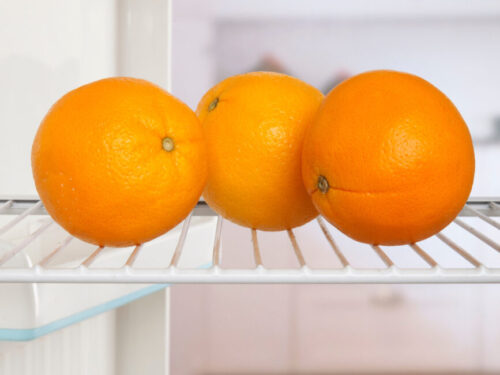
The Basics of Fruit Storage
Alright, let’s peel into the core principles of fruit storage. Understanding the basics will help you make the best choices for your fruity friends, ensuring they stay fresh, flavorful, and ready to eat.
General Rules of Thumb for Fruit Storage
- Room Temperature vs. Refrigeration: Some fruits thrive in the cool confines of your fridge, while others fare better at room temperature. The key is knowing which is which.
- Ripening Process: Many fruits continue to ripen after being picked. For these fruits, room temperature can encourage ripening, while refrigeration slows it down.
- Sensitivity to Cold: Some fruits can suffer from cold damage if refrigerated, leading to lost flavor, texture changes, or a mealy consistency.
- Post-Ripening Refrigeration: Once certain fruits have ripened at room temperature, popping them in the fridge can prolong their freshness.
How Temperature and Environment Affect Fruits
- Cold Environments: The fridge is great for slowing down decay and spoilage in fruits like berries and grapes, which can deteriorate quickly at room temperature.
- Warm Environments: Warmth can be a friend to fruits like bananas and avocados, helping them ripen to perfection. But beware, too much warmth can lead to overripening or spoilage.
- Humidity Factors: Fruits have different humidity needs. Some, like grapes, prefer a more humid environment (which many fridges provide), while others, like oranges, can tolerate drier conditions.
- Ethylene Sensitivity: Ethylene gas, naturally produced by some fruits, speeds up ripening. Fruits sensitive to ethylene can ripen too quickly or spoil if stored close to high-ethylene producers.
With these basic principles in mind, we can now explore which specific fruits should take a cool vacation in your fridge and which should bask in the warmth of your kitchen counter.
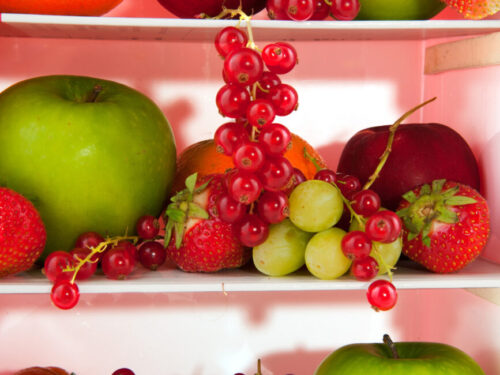
Fruits That Should Be Refrigerated
Certain fruits just love the fridge life, and for good reasons. Let’s take a closer look at these chilly characters and why they prefer the cold embrace of your refrigerator.
Berries: The Delicate Darlings
- Types: This includes strawberries, blueberries, raspberries, and blackberries.
- Why Refrigerate: Berries are quite delicate and can spoil quickly. The fridge helps slow down mold growth and keeps them fresh for longer.
- Storage Tip: Store berries in their original container or a breathable container, and only wash them right before eating to prevent excess moisture.
Grapes: The Juicy Bunch
- Keep ‘Em Cool: Grapes stay plump and juicy when refrigerated. Left at room temperature, they can lose their crispness and become soft.
- Storage How-To: Keep grapes in a perforated bag or their original packaging in the fridge. This helps maintain humidity and prevents them from drying out.
Apples: The Crisp Favorites
- Refrigeration Rewards: While apples can last a few days at room temperature, refrigerating them extends their shelf life significantly, keeping them crisp and juicy.
- Best Practice: Store apples in the crisper drawer of your fridge. If you have a lot, keeping them in a plastic bag with holes for air circulation works wonders.
Citrus Fruits: The Zesty Bunch
- Types: Think oranges, lemons, limes, and grapefruits.
- Why Refrigerate: While they can stay at room temperature for a few days, refrigerating citrus fruits prolongs their freshness and prevents mold.
- How to Store: Store in the fridge’s crisper drawer, either in mesh bags or loose.
The Reasons Behind the Chill
- Shelf Life Extension: Refrigeration slows down the ripening process and the growth of mold and bacteria, keeping fruits fresh for longer.
- Preserving Texture and Flavor: For many fruits, the cold temperature helps retain their crisp texture and vibrant flavor, making each bite as delightful as the first.
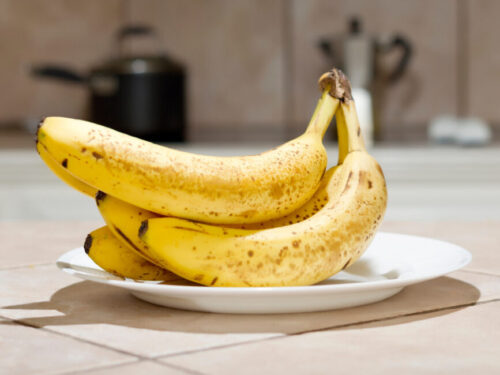
Fruits That Shouldn’t Be Refrigerated
There are some fruits that prefer the cozy corners of your kitchen counter to the brisk breeze of the fridge. Some fruits just thrive better at room temperature, and here’s why chilling out in the fridge isn’t always the coolest choice for them.
Bananas: The Tropical Treasures
- Keep Them Warm: Bananas, native to tropical climates, don’t take well to the cold. Refrigeration can actually halt their ripening process and turn their skins brown prematurely.
- Ripening Right: At room temperature, bananas ripen evenly and develop their signature sweet flavor and creamy texture.
Tomatoes: The Juicy Gems
- Flavor Fades in Cold: Tomatoes lose their rich, robust flavor when refrigerated. The cold temperature also affects their texture, making them mealy.
- Counter Culture: To maintain their juicy, flavorful best, store tomatoes on the countertop away from direct sunlight.
Melons: The Summery Sweets
- Pre-Cut vs. Whole: Whole melons like watermelons, cantaloupes, and honeydews are best kept at room temperature to retain their nutrients and flavors. However, once cut, store them in the fridge to keep them fresh and prevent bacterial growth.
- Texture Matters: Refrigerating whole melons can lead to a less flavorful and firmer texture.
The Chill Factor: Why Not All Fruits Love It
- Flavor and Texture Loss: For many room-temperature-loving fruits, the cold environment of a fridge can negatively impact their flavor development and texture.
- Ripening Interruption: Refrigeration can also interrupt the natural ripening process of certain fruits, leading to subpar taste and consistency.
Next, we’ll take a look at the fruits that like a bit of both worlds – ripening on the counter, then moving to the fridge.
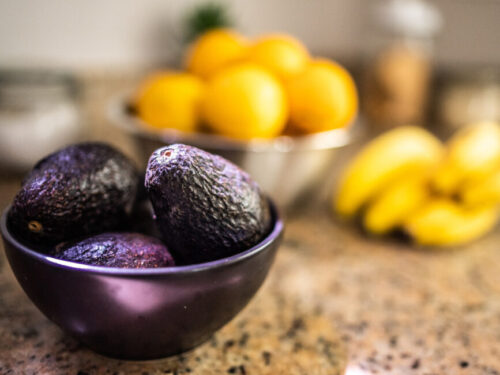
Special Cases: Ripen on Counter, Then Refrigerate
Navigating the world of fruit storage isn’t always straightforward, especially when some fruits play by their own rules. Let’s explore those special fruits that prefer a two-stage storage process: ripening on the counter first, then heading to the fridge. It’s like a mini-vacation for fruits – a stay at the counter resort, followed by a chill in the fridge spa!
Peaches and Nectarines: The Soft and Sweet Duo
- Ripen to Perfection: Peaches and nectarines need to ripen at room temperature to develop their full sweet flavor and juicy texture.
- The Softness Test: Gently press near the stem. When they yield slightly to pressure, they’re ripe and ready for the fridge.
- Refrigeration Time: Once ripe, refrigerate them to slow down the ripening process and extend their shelf life, but enjoy them within a few days for best taste.
Pears: The Delicate Balancers
- Patience Pays Off: Pears are best left to ripen at room temperature. Chilling them too early can lead to a gritty texture and lack of flavor.
- Check the Neck: Press gently near the stem end (the neck). If it gives slightly, your pear is ripe and can be refrigerated.
- Short Shelf Life: Pears can go from ripe to overripe quickly, so once they’re in the fridge, keep an eye on them and enjoy them while they’re just right.
Kiwis: The Tiny but Mighty
- Counter Ripening: Let kiwis ripen on the counter until they’re just the right amount of soft to the touch.
- Refrigerate After Ripening: Once they’re ripe, pop them in the fridge to keep them from overripening and maintain their sweet-tart balance.
Pineapples: The Tropical Stars
- Counter-Ripening: Pineapples should ripen at room temperature. Refrigeration can stop the ripening process, preventing them from developing their full sweet and tangy flavor.
- Chilling After Ripening: Once ripe, you can refrigerate pineapples to extend their shelf life, but consume them within a few days for best taste.
Mangoes: The Tropical Treats
- Room Temperature Ripening: Mangoes develop their best flavor and texture when allowed to ripen at room temperature.
- The Squeeze Test: A ripe mango will give slightly when squeezed gently. It should also have a fruity aroma at the stem end.
- Chill After Ripening: Once ripe, you can refrigerate mangoes to keep them fresh longer, but remember, their flavor is best enjoyed at room temperature.
Avocados: The Creamy Wonders
- Ripen on the Counter: Avocados should be left out at room temperature until they reach peak creaminess.
- Feel for Ripeness: A ripe avocado yields to gentle pressure and is slightly soft but not mushy.
- Refrigerate to Retain Creaminess: After they ripen, refrigerate avocados to slow down further ripening and enjoy them in the next couple of days.
The Ripen-Then-Chill Technique
- The Best of Both Worlds: This method allows these fruits to fully develop their flavors and textures at room temperature and then prolongs their freshness in the fridge.
- Mind the Timing: The key is to get the timing right – too early in the fridge, and you miss out on flavor; too late, and they may overripen or spoil.
By mastering the art of ripen-then-chill, you ensure that fruits like peaches, pears, and avocados offer you their best taste and texture. It’s a simple trick that can make a world of difference in your fruit-eating experience.
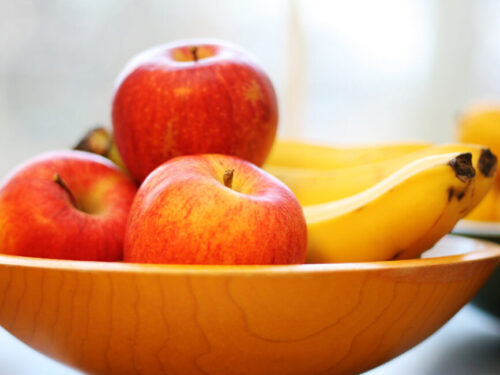
Ethylene Producers, Sensitive Fruits, and Practical Storage Tips
Combining the science of fruit ripening with some handy storage tips, let’s navigate the ethylene factor and how it affects our fruity friends. Understanding this will not only make you a savvy fruit keeper but also ensure you get the best out of your fruit bowl.
Ethylene: The Ripening Gas
- What is Ethylene? Ethylene is a natural gas produced by many fruits that accelerates ripening.
- Ethylene Producers: Some of the big ethylene producers include apples, bananas, and tomatoes. They can speed up the ripening process of other fruits around them.
- Sensitive to Ethylene: Fruits like avocados, melons, and peaches are sensitive to ethylene. Keeping them away from high ethylene producers can prevent them from ripening too quickly.
Storing Fruits with Ethylene in Mind
- Separate Storage: Store ethylene-producing fruits separately from those that are sensitive to it. This prevents premature ripening and potential spoilage.
- Room Temperature vs. Refrigeration: Consider the ethylene factor when deciding whether to store fruits at room temperature or in the fridge.
Practical Fruit Storage Tips
- Right Containers: Use perforated plastic bags or containers with some ventilation for fruits in the fridge. This allows ethylene to escape and reduces moisture build-up.
- Humidity Matters: Most fruits fare well in high humidity, but some like it drier. Apples, for instance, prefer a more humid environment, while citrus fruits are fine in drier conditions.
- Avoiding Cross-Contamination: Keep fruits away from strong-smelling foods in the fridge to prevent them from absorbing unwanted odors.
Tips for Storing Cut or Prepared Fruits
- Refrigerate After Cutting: Once you cut or prepare fruits, they should be refrigerated. This slows down spoilage and keeps them safe to eat.
- Airtight Containers: Store cut fruits in airtight containers to maintain freshness and prevent them from drying out or absorbing fridge odors.
- Quick Consumption: Enjoy cut fruits within a few days for best quality and taste.
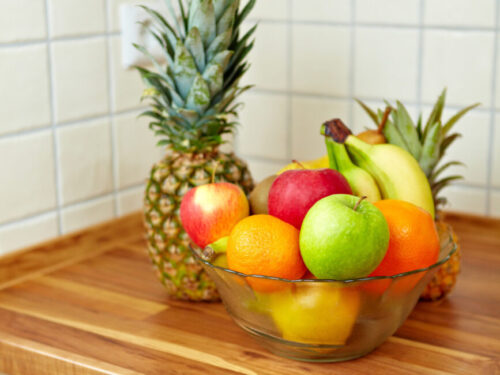
The Mystery of Storing Fruit — Solved!
The beauty of getting fruit storage right is twofold: not only do you also get to savor every piece of fruit at its peak of flavor and freshness, but there’s a certain satisfaction in knowing you’re doing your bit to minimize food waste – a win for your taste buds and the planet!
Now, I’m eager to hear from you. Do you have any fruit storage hacks up your sleeve? Maybe a family trick for keeping bananas yellow for longer or a tip for that perfectly ripe avocado? Share your wisdom, experiences, and queries in the comments below. Let’s turn this space into a treasure trove of fruity knowledge, where we can all learn from each other’s experiences.
Check Out Some of these Fruit-tastic Steamy Kitchen Recipes
- A Nifty Trick: How To Peel and Cut Kiwi Fruit
- Lychees, Longan, Rambutan!
- Pineapple, Kumquat and Ginger Crisp with Coconut Topping
- Grilled Shrimp Lettuce Cups with Tropical Fruit Salsa
The post Which Fruits Should Be Refrigerated? appeared first on Steamy Kitchen Recipes Giveaways.
from Steamy Kitchen Recipes Giveaways https://ift.tt/YIKfAvm
via New Kitchen Special
No comments:
Post a Comment